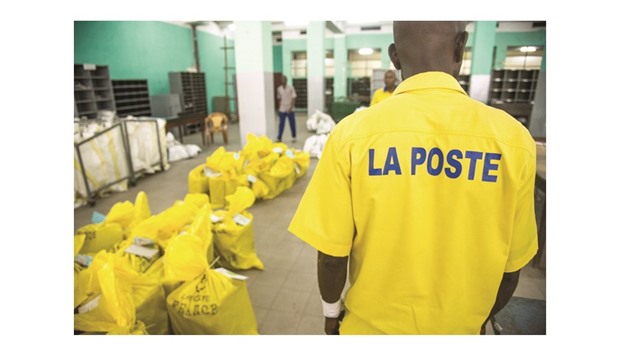“Getting a letter in the post is a first for me, and what’s more, at home!” says Odette Tshibambe, a student in her thirties in Kinshasa.
Her excitement is understandable.
After 30 years of turmoil for the postal service in the Democratic Republic of the Congo, letter carriers clad in smart canary yellow shirts have finally returned to the streets of the capital.
Anifa Kayumba, head of Kinshasa’s vast sorting office, recalls “dark times” during her 33 years on the job when dispirited workers would routinely go without pay.
The postal service’s headquarters was like a “funeral home”, she says, with a coffin blocking the entrance to mark a state of “permanent mourning”.
Customers lost all confidence in the service “because (most) of the packages were pilfered or lost”, says Elisabeth Lengema, a postal worker with 26 years’ experience.
At that time, employees only came to work to “rummage through” the parcels, taking home whatever valuables they could lay their hands on including watches, jewellery and tickets, adds Kayumba.
The handful of packages that escaped the attention of dishonest sorters were delivered to recipients’ homes only after the payment of special “transport costs” – assessed by how much the recipient appeared able to pay.
Even the home of the postal service, the vast art deco “Hotel de la Poste” building, a throwback to the Belgian colonial era between 1909 and 1960, had fallen into disrepair.
In recent years it had become a favoured haunt of street urchins and vagrants.
Postal service managers responded by “quitting the building and instead leasing smart offices at high rents” elsewhere, says Didier Musete, who was named head of the service in 2014.
He was tasked with returning not just the head office to its former glory, but also reviving the ailing postal system entirely.
The return to service was only made possible after a deal was struck in which employees gave up their claims for more than 80 months-worth of back pay arrears, instead settling for monthly salaries of several hundred dollars paid regularly.
Today, surrounded every morning by mountainous piles of neatly filled jute postal sacks, Kayumba is bullish about the future of her service.
The postmen and women of the vast metropolis of 10mn people have once again taken to the city on foot, on bicycles and even mopeds to deliver letters and parcels.
Honore Kabiena, a postman in his fifties, sets off on his yellow post service moped to deliver to several districts in the north of the capital including Gombe, Lingwala and Barumbu.
At every stop, he removes his helmet emblazoned with the words “La Poste” and updates his delivery manifest.
“Customers shouldn’t think that I’m going to ask them for a ‘shipping fee’,” says Kabiena, recalling the postal service’s difficult recent past.
On Kinshasa’s June 30 Boulevard, a sweeping avenue that cuts through the heart of the city close to the banks of the River Congo, even the Hotel de la Poste has had something of a facelift.
The imposing clock on the upper left corner of the wide edifice is once again keeping time after years of neglect.
Inside, the serving counters are busy once more.
Customers queue up to buy stamps, send items abroad and receive cash transfers from relatives living overseas.
Despite significant progress, the postal service is for the time being only able to handle post between overseas destinations and Kinshasa – there is not yet a functioning operation outside of the capital.
The DR Congo is a quarter of the size of the entire United States and is almost entirely devoid of infrastructure outside of its major cities.
A nationwide postal service will come in a second phase, according to Musete, who hopes to attract financial transfers from the vast Congolese diaspora around the world – one of Africa’s largest.
Currently, remittances from abroad are largely handled by the private sector, but Musete is hoping to attract transfers to the state-owned postal service to shore-up its bottom line.
The Congo’s postal service is far from profitable and is dependent on state funds – mainly those that come from fees charged to telecoms operators for use of an undersea fibre optic cable running under the Atlantic installed in 2014.
To secure growth, the postal service is hoping to sign deals with two large public sector clients – DR Congo’s water and electricity companies.
With 389 post offices nationwide, Musete is hopeful that the firms – which currently rely on private couriers – will increasingly turn to the postal service to send bills and reminders to their customers.

A postman works at a branch of the Congolese Company for Posts and Telecommunications (SCPT) in Kinshasa.
